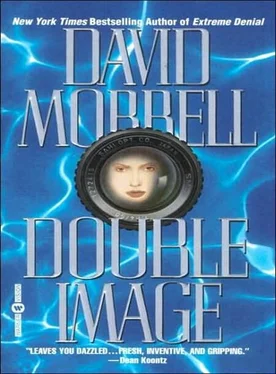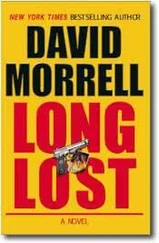And if this storm keeps on, I won’t be able to see a thing, Coltrane thought. He raced harder, knowing that he would eventually reach the gully that bisected the valley. A noise louder than the rain, the rush of water along the streambed, alerted him that he was getting closer. He stopped as the sound from the streambed intensified.
Peering down, he saw white-capped water churning along the gully. Not a flash flood. But if the storm persisted, the stream could easily turn into one. Even at its present strength, the flow of water looked dangerous. The problem was that to get to where McCoy’s car was on the other side, Coltrane would eventually have to cross it. But not here. The bank was too steep, the channel too narrow. The water would have too much strength.
Concerned that the bank might give way, he stepped back, then hurried along it. Although wary of Ilkovic, he couldn’t keep glancing around him. He had to concentrate on the stream. He had to find a shallow section where he could cross. But as he searched, he couldn’t help thinking of McCoy back at the ruin. Will he stay alive long enough for me to bring help? Maybe I shouldn’t have left him. What if Ilkovic searches the ruins and finds where I hid him? What if -
Coltrane tripped over a rock and landed on his shoulder. No! Rolling through a thick layer of mud, he banged against another rock and shivered from the chill of a puddle. He spat out gritty water. He restrained the impulse to cough, almost choking on fluid in his throat. He had no idea how much noise he had made when he fell, but he knew without doubt that he couldn’t risk making further noise, especially something so distinctive as a deep lung-clearing cough. Distraught that he had dropped the shotgun and the walkie-talkie, he crawled, pawing among the muddy puddles through which he had rolled. What if I can’t find -
His left hand trembled when he grasped the walkie-talkie. His right knee grazed the shotgun. Had they been damaged when they fell? Had the mud clogged them? In the darkening rain, he brushed them off. He fingered mud from the shotgun’s barrel. As for the firing mechanism, he had no way to check it.
Keep moving! If the stream gets higher…
Stumbling along the gully, he reached where it curved. Ahead, in the shadows, the embankment was less pronounced. Puddles filled what seemed to be wheel tracks coming out of it. Coltrane tingled as he told himself that he had reached where the road descended into the trough and then rose from the stream.
He started down. Near the bottom, the churning stream tugged at his calves. He waded farther, determined, feeling the rushing water strengthen. He lost his footing, regained it, willed his legs to move harder, felt the mushy ground tilt upward, and reached the other side.
He had only a hundred yards to go before he would reach McCoy’s car. His pulse swelling his veins, he anticipated the excitement of scrambling into McCoy’s car, starting it, and fleeing back to the Pacific Coast Highway to get help. By the time Ilkovic realized what was happening, it would be too late for him to do anything. If I can find a police car quickly enough, Coltrane told himself, the authorities might even be able to trap Ilkovic in the valley.
Hurry.
But just before he crested the slippery embankment, his body moved less willingly, a dark suspicion holding him back. From the distance of the ruins, it had seemed a good idea to come here. But now that Coltrane was actually close, doubts seized him. Wasn’t McCoy’s car an obvious target? Wouldn’t Ilkovic assume that if Coltrane got the chance, he would head for it, the only means of escape? Rather than risk getting shot stalking toward the ruins, wouldn’t Ilkovic want to wait at McCoy’s car and shoot Coltrane when he stalked toward the vehicle?
He felt paralyzed, unable to decide what to do. He wouldn’t accomplish anything by returning to the ruins. But he couldn’t stay where he was. A sense of déjà vu again possessed him. He was taken back to when he had driven into this valley, hidden his car in this trough, and crept toward McCoy’s car, although at the time he had thought that it was Ilkovic’s car. He had followed a stream that connected with this one at a right angle. That other stream paralleled the road on which McCoy’s car was parked. The stream and the road were thirty yards away from each other. Retreating from the crest of the trough, heading to the right, Coltrane approached the other stream as he had done earlier – with the major differences that now dusk was setting in and the stream’s gully was swollen with rain. This time, he couldn’t hurry along the bottom. He had to ease up the side and shift along the muddy incline.
He unbuttoned his soaked shirt, shoved the walkie-talkie under it, and rebuttoned the shirt. With his left hand free, he could now better balance himself and hold the shotgun as he proceeded cautiously along the side of the gully.
The rising stream licked at his mud-caked sneakers. His feet felt cold, the tips of his fingers numb. Inching higher to get away from the stream, reaching the limit of where he could crouch and still not be seen from McCoy’s car, he counted his steps, trying to calculate when he had gone a hundred yards. Just to be certain, he went a little farther, but his mounting sense of urgency finally compelled him to stop and peer over the top of the gully.
He couldn’t see the car. As the rain increased and the air became grayer, he wiped water from his eyes and stared harder, but he still couldn’t see it. Is it farther away than I guessed? Did I go too far?
Easing over the rim, pressing himself flat, he crawled through mud, using his elbows for traction, keeping his hands and the shotgun they held out of the water. The revolver under his belt and the walkie-talkie under his shirt gouged against his stomach, but he hardly noticed the pain, too intent on what was before him.
After squirming forward for what he estimated was ten yards, he saw a vague hulking shape in the wavering curtain of the storm. McCoy’s car. To his left. He had indeed gone past it while he made his way along the gully. Adjusting his direction, trying not to make noise in the mud, he crawled toward it.
He stopped as the vehicle became more distinct. He was about fifteen yards from the car’s left-rear fender. There wasn’t any sign of Ilkovic behind the car or on this side. But that didn’t mean he wasn’t on the other side.
Changing direction, Coltrane kept a distance and warily maneuvered around the back of the vehicle. All the while, he strained to see beneath it. If Ilkovic was hiding on the other side, his legs might be visible through the gap underneath. But the myriad splashes of rain made it impossible for Coltrane to see anything that close to the ground. Cautious, he reached a place where he had a view of the opposite side of the car. Still no sign of Ilkovic.
Coltrane dared to hope.
But what if Ilkovic is inside the car? I can’t just keep lying in the rain. McCoy needs help. Rising to a crouch, he braced himself to run toward the car. When he reached the rear window, he planned to aim the shotgun and blast the backseat, spraying it with buckshot. If Ilkovic was inside, that would be his likely hiding place. If he wasn’t in the car, the blast from the shotgun would bring him running, but not before Coltrane could rush into the car, start it, and escape.
Mustering his nerve, Coltrane couldn’t help worrying that the car wouldn’t be able to get traction in the mud. He never got the chance to find out.
The car burst into flames.
IT DIDN’T SO MUCH EXPLODE AS ERUPT, fire spewing from the gas tank, engulfing the car. With a grotesque whooshing sound, a wall of heat struck Coltrane and thrust him backward, the flames so powerful that the storm was powerless to extinguish them.
Читать дальше












